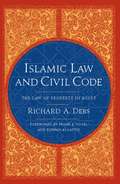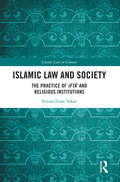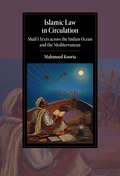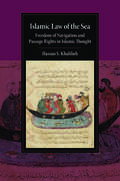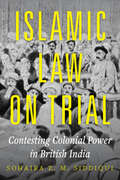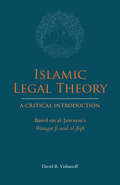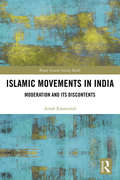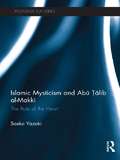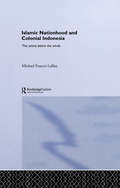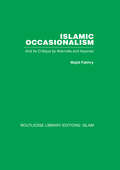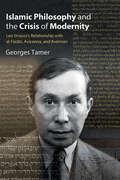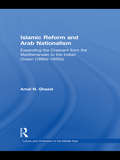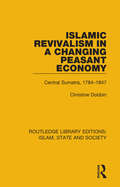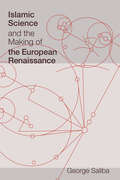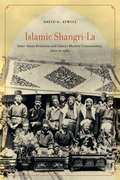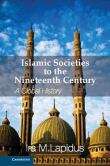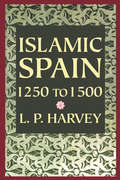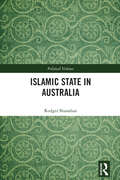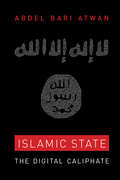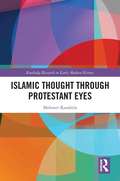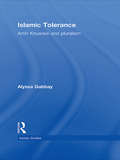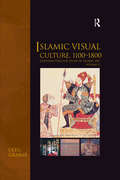- Table View
- List View
Islamic Law and Civil Code: The Law of Property in Egypt
by Richard DebsRichard A. Debs analyzes the classical Islamic law of property based on the Shari'ah, traces its historic development in Egypt, and describes its integration as a source of law within the modern format of a civil code. He focuses specifically on Egypt, a country in the Islamic world that drew upon its society's own vigorous legal system as it formed its modern laws. He also touches on issues that are common to all such societies that have adopted, either by choice or by necessity, Western legal systems.Egypt's unique synthesis of Western and traditional elements is the outcome of an effort to respond to national goals and requirements. Its traditional law, the Shari'ah, is the fundamental law of all Islamic societies, and Debs's analysis of Egypt's experience demonstrates how Islamic jurisprudence can be sophisticated, coherent, rational, and effective, developed over centuries to serve the needs of societies that flourished under the rule of law.
Islamic Law and Society: The Practice Of Iftā’ And Religious Institutions (Islamic Law in Context)
by Emine Enise YakarThis book places context at the core of the Islamic mechanism of iftā’ to better understand the process of issuing fatwās in Muslim and non-Muslim countries, thus highlighting the connection between context and contemporaneity, on one hand, and the adaptable perception of Islamic law, on the other. The practice of iftā’ is one of the most important mechanisms of Islamic law that keeps Islamic thought about ethical and legal issues in harmony with the demands, exigencies and developments of time. This book builds upon the existing body of work related to the practice of iftā’, but takes the discussion beyond the current debates with the intent of unveiling the interaction between Islamic legal methodologies and different environmental contexts. The book specifically addresses the three institutions (Saudi Arabia’s Dār al-Iftā’, Turkey’s Diyanet and America’s FCNA) and their Islamic legal opinions (fatwās) in a comparative framework. This demonstrates the existence of complex and diverse ideas around similar issues within contemporary Islamic legal opinions that is further complicated by the influence of international, social, political, cultural and ideological contexts. The book thus unveils a more complicated range of interactive constituents in the process of the practice of iftā’ and its outputs, fatwās. The work will be of interest to academics and researchers working in the areas of Islamic law, Middle Eastern studies, religion and politics.
Islamic Law in Circulation: Shafi'i Texts across the Indian Ocean and the Mediterranean (Cambridge Studies in Islamic Civilization)
by Mahmood KooriaAnalysing the spread and survival of Islamic legal ideas and commentaries in the Eastern Mediterranean and the Indian Ocean littorals, Islamic Law in Circulation focuses on Shāfiʿīsm, one of the four Sunnī schools of Islamic law. It explores how certain texts shaped, transformed and influenced the juridical thoughts and lives of a significant community over a millennium in and between Asia, Africa and Europe. By examining the processes of the spread of legal texts and their roles in society, as well as thinking about how Afrasian Muslims responded to these new arrivals of thoughts and texts, Mahmood Kooria weaves together a narrative with the textual descendants from places such as Damascus, Mecca, Cairo, Malabar, Java, Aceh and Zanzibar to tell a compelling story of how Islam contributed to the global history of law from the thirteenth to the twentieth century.
Islamic Law of the Sea: Freedom of Navigation and Passage Rights in Islamic Thought (Cambridge Studies in Islamic Civilization)
by Hassan S. KhaliliehThe doctrine of modern law of the sea is commonly believed to have developed from Renaissance Europe. Often ignored though is the role of Islamic law of the sea and customary practices at that time. In this book, Hassan S. Khalilieh highlights Islamic legal doctrine regarding freedom of the seas and its implementation in practice. He proves that many of the fundamental principles of the pre-modern international law governing the legal status of the high seas and the territorial sea, though originating in the Mediterranean world, are not a necessarily European creation. Beginning with the commonality of the sea in the Qur'an and legal methods employed to insure the safety, security, and freedom of movement of Muslim and aliens by land and sea, Khalilieh then goes on to examine the concepts of the territorial sea and its security premises, as well as issues surrounding piracy and its legal implications as delineated in Islamic law.
Islamic Law on Trial: Contesting Colonial Power in British India
by Dr. Sohaira Z. SiddiquiPrior to the East India Company’s establishment in India in 1661, Islamic law was widely applied by the Mughal Empire. But as the Company’s power grew, it established a court system intended to limit Islamic law. Following the Great Rebellion of 1857, the decentralized Islamic legal system was replaced with a new standardized system. Islamic Law on Trial interrogates the project of juridical colonization and demonstrates that alongside—and despite—the violent displacement of Muslim legal sovereignty, Muslims were able to engage with and even champion Islamic law from inside the colonial judiciary. The outcome of their work was a paradoxical legal terrain that appeared legitimate to both Muslim practitioners and English colonizers. Sohaira Siddiqui challenges long-standing assumptions about Islamic law under British rule, the ways in which colonial power displaced preexisting traditions, and how local Muslim elites navigated the new institutions imposed upon them.
Islamic Law, Gender, and Social Change in Post-Abolition Zanzibar
by Elke E. StockreiterAfter the abolition of slavery in 1897, Islamic courts in Zanzibar (East Africa) became central institutions where former slaves negotiated socioeconomic participation. By using difficult-to-read Islamic court records in Arabic, Elke E. Stockreiter reassesses the workings of these courts as well as gender and social relations in Zanzibar Town during British colonial rule (1890-1963). She shows how Muslim judges maintained their autonomy within the sphere of family law and describes how they helped advance the rights of women, ex-slaves, and other marginalised groups. As was common in other parts of the Muslim world, women usually had to buy their divorce. Thus, Muslim judges played important roles as litigants negotiated moving up the social hierarchy, with ethnicisation increasingly influencing all actors. Drawing on these previously unexplored sources, this study investigates how Muslim judges both mediated and generated discourses of inclusion and exclusion based on social status rather than gender.
Islamic Legal Theory: Based on al-Juwayni's Waraqat fi usul al-fiqh
by David R. VishanoffDavid Vishanoff&’s thorough and original unpacking of the Sunnī jurist al-Juwaynī&’s (1028–1085) Kitāb al-Waraqāt fī uṣūl al-fiqh introduces English-speaking readers to the main concepts, terms, principles, and functions of the classical Islamic discipline of legal theory. This volume offers an ideal entry to the otherwise dense and complex mainstream Sunnī views that dominated Islamic legal thought in al-Juwaynī&’s day—and that are still widely accepted today. A critical edition of al-Juwaynī&’s Arabic text is also included.
Islamic Movements in India: Moderation and its Discontents (Royal Asiatic Society Books)
by Arndt-Walter EmmerichThis book analyses the emerging trend of Muslim-minority politics in India and illustrates that a fundamental shift has occurred over the last 20 years from an identity-dominated, self-serving and inward-looking approach by Muslim community leaders, Islamic authorities and social activists that seeks to protect Islamic law and culture, towards an inclusive debate centred on socio-economic marginalisation and minority empowerment. The book focuses on Muslim activists, and members and affiliates of the Popular Front of India (PFI), a growing Muslim-minority and youth movement. Drawing on qualitative fieldwork undertaken since 2011, the author analyses recent literature on Muslim citizenship politics and the growing involvement of Islamist organisations and movements in the democratic process and electoral politics to demonstrate that religious groups play a role in politics, development, and policy making, which is often ignored within political theory. The book suggests that further scrutiny is needed of the assumption that Muslim politics and Islamic movements are incompatible with the democratic political framework of the modern nation state in India and elsewhere. Contributing to a more nuanced understanding of how Islamic movements utilise various spiritual, organisational and material resources and strategies for collective action, community development and democratic engagement, the book will be of interest to academics in the field of political Islam, South Asian studies, sociology of religion and development studies.
Islamic Mysticism and Abu Talib Al-Makki: The Role of the Heart (Routledge Sufi Series)
by Saeko YazakiBoth in everyday language and religious metaphor, the heart often embodies the true self and is considered to be the seat of emotion in many cultures. Many Muslim thinkers have attempted to clarify the nature of Sufism using its metaphorical image, particularly in the tenth and eleventh centuries. This book examines the work of Abū Tālib al-Makkī and his wider significance within the Sufi tradition, with a focus on the role of the heart. Analysing his most significant work, Qūt al-qulūb (‘The Nourishment of Hearts’), the author goes beyond an examination of the themes of the book to explore its influence not only in the writing of Sufis, but also of Hanbalī and Jewish scholars. Providing a comprehensive overview of the world of al-Makkī and presenting extracts from his book on religious characteristics of the heart with selected passages in translation for the first time in English, this book will give readers a better understanding not only of the essential features of Sufism, but also the nature of mysticism and its relation to monotheistic faiths.
Islamic Nationhood and Colonial Indonesia: The Umma Below the Winds (SOAS/Routledge Studies on the Middle East)
by Michael Francis LaffanDrawing on previously unavailable archival material, this book argues that Indonesian nationalism rested on Islamic ecumenism heightened by colonial rule and the pilgrimage. The award winning author Laffan contrasts the latter experience with life in Cairo, where some Southeast Asians were drawn to both reformism and nationalism. After demonstrating the close linkage between Cairene ideology and Indonesian nationalism, Laffan shows how developments in the Middle East continued to play a role in shaping Islamic politics in colonial Indonesia.
Islamic Occasionalism: and its critique by Averroes and Aquinas
by Majid FakhryOriginally published in 1958.Occasionalism is generally associated in the history of philosophy with the name of Malébranche . But long before this time, the Muslim Theologians of the ninth and tenth centuries had developed an occasionalist metaphysics of atoms and accidents. Arguing that a number of distinctively Islamic concepts such as fatalism and the surrender of personal endeavour cannot be fully understood except in the perspective of the occasionalist world view of Islam, the volume also discusses the attacks on Occasionalism made by Averroes and St. Thomas Aquinas.
Islamic Philosophy and the Crisis of Modernity: Leo Strauss's Relationship with al-Fārābī, Avicenna, and Averroes (SUNY series in the Thought and Legacy of Leo Strauss)
by Georges TamerThis study examines the impact of the medieval Muslim philosophers al-Fārābī, Ibn Sīnā (Avicenna) and Ibn Rushd (Averroes) on Leo Strauss. Through meticulous source analysis, Georges Tamer critically evaluates Strauss's interpretation of their works. Furthermore, he explores how Islamic philosophy shaped Strauss's understanding of Maimonides and Plato, providing a compelling solution to the modernity crisis he identified. Offering fresh perspectives on the evolution of Strauss's thought and his distinctive approach to Arabic sources, Tamer sheds light on the pivotal role of al-Fārābī, the most significant Muslim philosopher in Strauss's view, including key aspects of al-Fārābī's political philosophy and his nuanced take on Plato's ideas. Islamic Philosophy and the Crisis of Modernity is a valuable addition to current scholarship on Strauss. Both philosophically erudite and philologically rigorous, Tamer presents the reader with a balanced perspective on Strauss's insights without being overly reverential or dismissive.
Islamic Populism in Indonesia and the Middle East
by Vedi R. HadizIn a novel approach to the field of Islamic politics, this provocative new study compares the evolution of Islamic populism in Indonesia, the country with the largest Muslim population in the world, to the Middle East. Utilising approaches from historical sociology and political economy, Vedi R. Hadiz argues that competing strands of Islamic politics can be understood as the product of contemporary struggles over power, material resources and the result of conflict across a variety of social and historical contexts. Drawing from detailed case studies across the Middle East and Southeast Asia, the book engages with broader theoretical questions about political change in the context of socio-economic transformations and presents an innovative, comparative framework to shed new light on the diverse trajectories of Islamic politics in the modern world.
Islamic Reform and Arab Nationalism: Expanding the Crescent from the Mediterranean to the Indian Ocean (1880s-1930s) (Culture and Civilization in the Middle East)
by Amal N. GhazalBridging African and Arab histories, this book examines the relationship between Islam, nationalism and the evolution of identity politics from late 19th Century to World War II. It provides a cross-national, cross-regional analysis of religious reform, nationalism, anti-colonialism from Zanzibar to Oman, North Africa and the Middle East. This book widens the scope of modern Arab history by integrating Omani rule in Zanzibar in the historiography of Arab nationalism and Islamic reform. It examines the intellectual and political ties and networks between Zanzibar, Oman, Algeria, Egypt, Istanbul and the Levant and the ways those links shaped the politics of identity of the Omani elite in Zanzibar. Out of these connections emerges an Omani intelligentsia strongly tied to the Arab cultural nahda and to movements of Islamic reform, pan-Islamism and pan-Arabism. The book examines Zanzibari nationalism, as formulated by the Omani intelligentsia, through the prism of these pan-Islamic connections and in the light of Omani responses to British policies in Zanzibar. The author sheds light on Ibadism - an overlooked sect of Islam - and its modern intellectual history and the role of the Omani elite in bridging Ibadism with pan-Islamism and pan-Arabism. Although much has been written about nationalism in the Arab world, this is the first book to discuss nationalism in Zanzibar in the wider context of religious reform and nationalism in the Arab world, and the first to offer a new framework of analysis to the study of pan-Islamic and pan-Arab movements and nationalism.
Islamic Revivalism in a Changing Peasant Economy: Central Sumatra, 1784-1847 (Routledge Library Editions: Islam, State and Society)
by Christine DobbinThis title, first published in 1983, is a significant study of one of the many revivalist movements which flowered in numerous Islamic societies in the late eighteenth and early nineteenth centuries, and attempts to provide one particular assessment of the place of revivalism in the evolution of Islamic societies. The subject of this title is the Padri movement, and the community involved is that of the Minangkabau of Central Sumatra, one of the major communities inhabiting the Indonesian archipelago. In the process of considering the reconstruction of a society in the throes of an agricultural transformation, the historical development of the Indonesian village became the object of attention, encompassing the economic and social histories of individual villages. This title will be of interest to students of history and Islamic Studies.
Islamic Science and the Making of the European Renaissance (Transformations: Studies in the History of Science and Technology)
by George SalibaThe rise and fall of the Islamic scientific tradition, and the relationship of Islamic science to European science during the Renaissance. The Islamic scientific tradition has been described many times in accounts of Islamic civilization and general histories of science, with most authors tracing its beginnings to the appropriation of ideas from other ancient civilizations—the Greeks in particular. In this thought-provoking and original book, George Saliba argues that, contrary to the generally accepted view, the foundations of Islamic scientific thought were laid well before Greek sources were formally translated into Arabic in the ninth century. Drawing on an account by the tenth-century intellectual historian Ibn al-Naidm that is ignored by most modern scholars, Saliba suggests that early translations from mainly Persian and Greek sources outlining elementary scientific ideas for the use of government departments were the impetus for the development of the Islamic scientific tradition. He argues further that there was an organic relationship between the Islamic scientific thought that developed in the later centuries and the science that came into being in Europe during the Renaissance.Saliba outlines the conventional accounts of Islamic science, then discusses their shortcomings and proposes an alternate narrative. Using astronomy as a template for tracing the progress of science in Islamic civilization, Saliba demonstrates the originality of Islamic scientific thought. He details the innovations (including new mathematical tools) made by the Islamic astronomers from the thirteenth to sixteenth centuries, and offers evidence that Copernicus could have known of and drawn on their work. Rather than viewing the rise and fall of Islamic science from the often-narrated perspectives of politics and religion, Saliba focuses on the scientific production itself and the complex social, economic, and intellectual conditions that made it possible.
Islamic Shangri-La: Inter-Asian Relations and Lhasa's Muslim Communities, 1600 to 1960
by David G. AtwillA free ebook version of this title is available through Luminos, University of California Press’s Open Access publishing program for monographs. Visit www.luminosoa.org to learn more.Islamic Shangri-La transports readers to the heart of the Himalayas as it traces the rise of the Tibetan Muslim community from the 17th century to the present. Radically altering popular interpretations that have portrayed Tibet as isolated and monolithically Buddhist, David Atwill's vibrant account demonstrates how truly cosmopolitan Tibetan society was by highlighting the hybrid influences and internal diversity of Tibet. In its exploration of the Tibetan Muslim experience, this book presents an unparalleled perspective of Tibet's standing during the rise of post–World War II Asia.
Islamic Societies to the Nineteenth Century
by Ira M. LapidusFirst published in 1988, Ira Lapidus' A History of Islamic Societies has become a classic in the field, enlightening students, scholars, and others with a thirst for knowledge about one of the world's great civilizations. This book, based on fully revised and updated parts one and two of this monumental work, describes the transformations of Islamic societies from their beginning in the seventh century, through their diffusion across the globe, into the challenges of the nineteenth century. The story focuses on the organization of families and tribes, religious groups and states, showing how they were transformed by their interactions with other religious and political communities. The book concludes with the European commercial and imperial interventions that initiated a new set of transformations in the Islamic world, and the onset of the modern era. Organized in narrative sections for the history of each major region, with innovative, analytic summary introductions and conclusions, this book is a unique endeavour.
Islamic Spain 1250 to 1500
by L. P. HarveyThis is a richly detailed account of Muslim life throughout the kingdoms of Spain, from the fall of Seville, which signaled the beginning of the retreat of Islam, to the Christian reconquest. "Harvey not only examines the politics of the Nasrids, but also the Islamic communities in the Christian kingdoms of the peninsula. This innovative approach breaks new ground, enables the reader to appreciate the situation of all Spanish Muslims and is fully vindicated. . . . An absorbing and thoroughly informed narrative. "—Richard Hitchcock, Times Higher Education Supplement "L. P. Harvey has produced a beautifully written account of an enthralling subject. "—Peter Linehan, The Observer
Islamic Spain: 1250 to 1500
by L.P. HarveyThis account of Muslim life in late medieval Spain is &“a beautifully written account of an enthralling subject&” (The Observer). From an acclaimed scholar in the field, this is a richly detailed account of Muslim life throughout the kingdoms of Spain from the fall of Seville, which signaled the beginning of the retreat of Islam, to the Christian reconquest. Together with L.P. Harvey&’s following volume, Muslims in Spain 1500–1614, it provides an in-depth look at the experiences of this population from the late medieval to the early modern period. &“Harvey not only examines the politics of the Nasrids, but also the Islamic communities in the Christian kingdoms of the peninsula. This innovative approach breaks new ground, enables the reader to appreciate the situation of all Spanish Muslims. . . . An absorbing and thoroughly informed narrative.&” —Times Higher Education Supplement &“[A] clearly written, comprehensive, and illuminating study detailing the final three centuries of the Islamic presence in the Iberian Peninsula.&” —Library Journal &“Masterly narrative history . . . an outstanding work.&” —Muslim World Book Review &“Few historians in the English-speaking world could give a coherent account of the political history of Muslim Granada. Harvey does this skillfully.&” —History Today
Islamic State in Australia (Political Violence)
by Rodger ShanahanThis book fills a gap in our knowledge about the activities of Western supporters and members of Islamic State by examining the experience of their Australian cohort. More than 200 Australian men, women and children travelled to Syria and Iraq to fight with Islamist groups and to help establish an Islamic State by force. Dozens more assisted Islamic State by supporting those overseas or by planning or carrying out terrorist attacks in Australia. For all that, little is publicly known about the impact of the Syrian conflict on Australia’s radical Islamists. This book provides a well-researched examination of how and why so many Australians travelled to fight for or otherwise supported Islamic State. From the failed attempt to bring down an Etihad passenger plane en route from Sydney to Abu Dhabi, to showing their children holding the heads of Syrian soldiers, Australians were prominent in carrying out Islamic State’s directions. Using a range of Australian and foreign court records, social and mainstream media content, this book provides the first detailed look at who these people were, what tasks they carried out, how they came to adopt this radical view of Islam and what long-term legal and security implications are likely to result from their actions. This book will be of interest to students of terrorism, political Islam and security studies.
Islamic State: The Digital Caliphate
by Abdel Bari AtwanIslamic State stunned the world when it overran an area the size of Great Britain on both sides of the Iraq-Syria border in a matter of weeks and proclaimed the birth of a new Caliphate. In this timely and important book, Abdel Bari Atwan draws on his unrivaled knowledge of the global jihadi movement and Middle Eastern geopolitics to reveal the origins and modus operandi of Islamic State. Based on extensive field research and exclusive interviews with IS insiders, Islamic State outlines the group's leadership structure, as well as its strategies, tactics, and diverse methods of recruitment. Atwan traces the Salafi-jihadi lineage of IS, its ideological differences with al Qaeda and the deadly rivalry that has emerged between their leaders. He also shows how the group's rapid growth has been facilitated by its masterful command of social media platforms, the "dark web," Hollywood blockbuster-style videos, and even jihadi computer games, producing a powerful paradox where the ambitions of the Middle Ages have reemerged in cyberspace. As Islamic State continues to dominate the world's media headlines with horrific acts of ruthless violence, Atwan considers the movement's chances of survival and expansion and offers indispensable insights on potential government responses to contain the IS threat.
Islamic Thought Through Protestant Eyes
by Mehmet KarabelaEarly modern Protestant scholars closely engaged with Islamic thought in more ways than is usually recognized. Among Protestants, Lutheran scholars distinguished themselves as the most invested in the study of Islam and Muslim culture. Mehmet Karabela brings the neglected voices of post-Reformation theologians, primarily German Lutherans, into focus and reveals their rigorous engagement with Islamic thought. Inspired by a global history approach to religious thought, Islamic Thought Through Protestant Eyes offers new sources to broaden the conventional interpretation of the Reformation beyond a solely European Christian phenomenon. Based on previously unstudied dissertations, disputations, and academic works written in Latin in the seventeenth and eighteenth centuries, Karabela analyzes three themes: Islam as theology and religion; Islamic philosophy and liberal arts; and Muslim sects (Sunni and Shi‘a). This book provides analyses and translations of the Latin texts as well as brief biographies of the authors. These texts offer insight into the Protestant perception of Islamic thought for scholars of religious studies and Islamic studies as well as for general readers. Examining the influence of Islamic thought on the construction of the Protestant identity after the Reformation helps us to understand the role of Islam in the evolution of Christianity.
Islamic Tolerance: Amir Khusraw and Pluralism (Iranian Studies)
by Alyssa GabbayAlthough pluralism and religious tolerance are most often associated today with Western Enlightenment thinkers, the roots of these ideologies stretch back to non-Western and premodern societies, including many under Muslim rule. This book explores the development of pluralism in Islam in South Asia through the work of the poet, historian and musician Amir Khusraw and sheds new light on how Islam developed its own culture of tolerance. Countering stereotypes of Islam as intrinsically intolerant, the book provides a better understanding of how rhetorics of pluralism develop, which may aid in identifying and encouraging such discourses in the present. Khusraw, a practicing Muslim who showed great affection toward Hindus and used much indigenous imagery in his poetry, is an ideal figure through whom to explore these issues. Addressing issues of ethnicity, religion and gender in the early medieval period, Alyssa Gabbay demonstrates the pre-modern precedents for pluralism, conveying the broad sweep of Perso-Islamicate culture and the profound transformations it underwent in medieval South Asia. Accurately depicting the paradoxicality and jaggedness involved in the development of its composite culture, this book will have great relevance to scholars and students of Islam in South Asia, gender, religious pluralism, and Persian literature.
Islamic Visual Culture, 1100-1800: Constructing the Study of Islamic Art, Volume II (Variorum Collected Studies)
by Oleg GrabarIslamic Visual Culture, 1100-1800 is the second in a set of four volumes of studies on Islamic art by Oleg Grabar. Between them they bring together more than eighty articles, studies and essays, work spanning half a century by a master of the field. Each volume takes a particular section of the topic, the three other volumes being entitled: Early Islamic Art 650-1100; Islamic Art and Beyond; and Jerusalem. Reflecting the many incidents of a long academic life, they illustrate one scholar's attempt at making order and sense of 1400 years of artistic growth. They deal with architecture, painting, objects, iconography, theories of art, aesthetics and ornament, and they seek to integrate our knowledge of Islamic art with Islamic culture and history as well as with the global concerns of the History of Art. In addition to the articles selected, each volume contains an introduction which describes, often in highly personal ways, the context in which Grabar's scholarship developed and the people who directed and mentored his efforts. The focus of the present volume is on the key centuries - the eleventh through fourteenth - during which the main directions of traditional Islamic art were created and developed and for which classical approaches of the History of Art were adopted. Manuscript illustrations and the arts of objects dominate the selection of articles, but there are also forays into later times like Mughal India and into definitions of area and period styles, as with the Mamluks in Egypt and the Ottomans, or into parallels between Islamic and Christian medieval arts.
